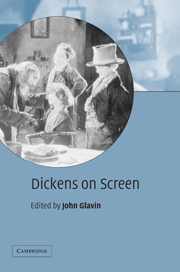Book contents
- Frontmatter
- Contents
- List of illustrations
- Notes on the contributors
- Acknowledgments
- Introduction
- Part I
- Part II
- 2 David Copperfield's home movies
- 3 David Lean's Great Expectations
- 4 Great Expectations on Australian television
- 5 Dickens's “The Signalman” and Rubini's La stazione
- 6 Bill Murray's Christmas Carols
- 7 Screen memories in Dickens and Woody Allen
- Part III
- Part IV
- Part V
- Index
- References
7 - Screen memories in Dickens and Woody Allen
Published online by Cambridge University Press: 22 September 2009
- Frontmatter
- Contents
- List of illustrations
- Notes on the contributors
- Acknowledgments
- Introduction
- Part I
- Part II
- 2 David Copperfield's home movies
- 3 David Lean's Great Expectations
- 4 Great Expectations on Australian television
- 5 Dickens's “The Signalman” and Rubini's La stazione
- 6 Bill Murray's Christmas Carols
- 7 Screen memories in Dickens and Woody Allen
- Part III
- Part IV
- Part V
- Index
- References
Summary
Love is now the stardust of yesterday,
The music of the years gone by.
Mitchell ParishPsychoanalysts have loosely defined screen memories as forms of remembering whose content works to disguise or divert from conscious thought some strong, still painful, dangerous, or shameful emotional event or current, usually from childhood. I want to compare revealing screen memories in the work of Charles Dickens and Woody Allen, and in doing so point out the rich irony in the unfolding history of that word screen. What meant something that keeps you from seeing somehow turned into a site and apparatus of light that lets you view what before you never could. A means of deflecting attention, keeping the heat off (a firescreen is one of the earliest OED definitions of screen), or hiding something from public scrutiny and even your own consciousness becomes the center of cinematic projection where you can see illuminated the new featured subject. These different meanings of the same word can stand for a basic principle underlying the creation of much art and its power of enlightenment: what needs a screen needs a screening.
Artists often use the screens they construct around their emotional obsessions to project fantasy images that let you see into the buried, but volcanic, desires that shape people and culture.
- Type
- Chapter
- Information
- Dickens on Screen , pp. 72 - 86Publisher: Cambridge University PressPrint publication year: 2003



